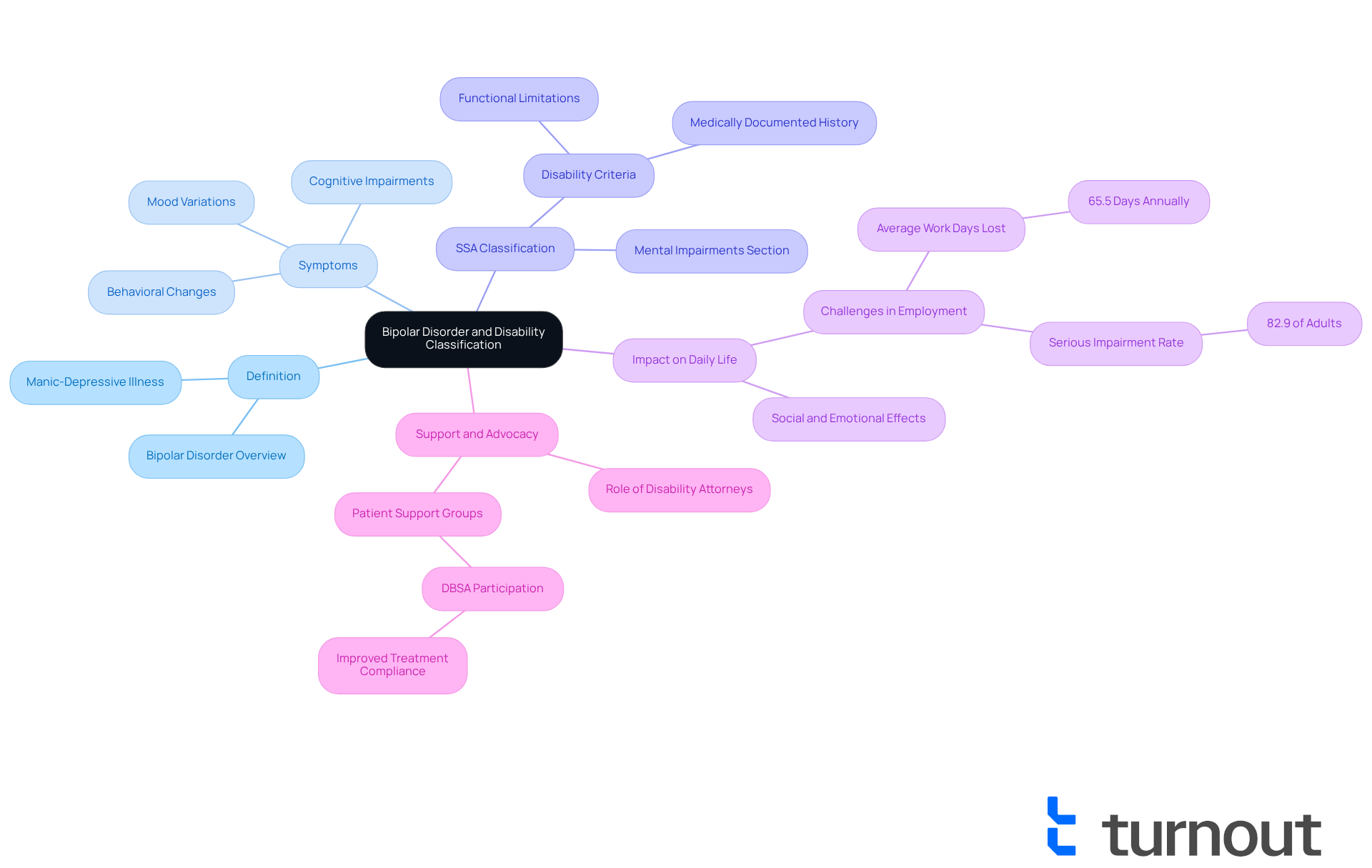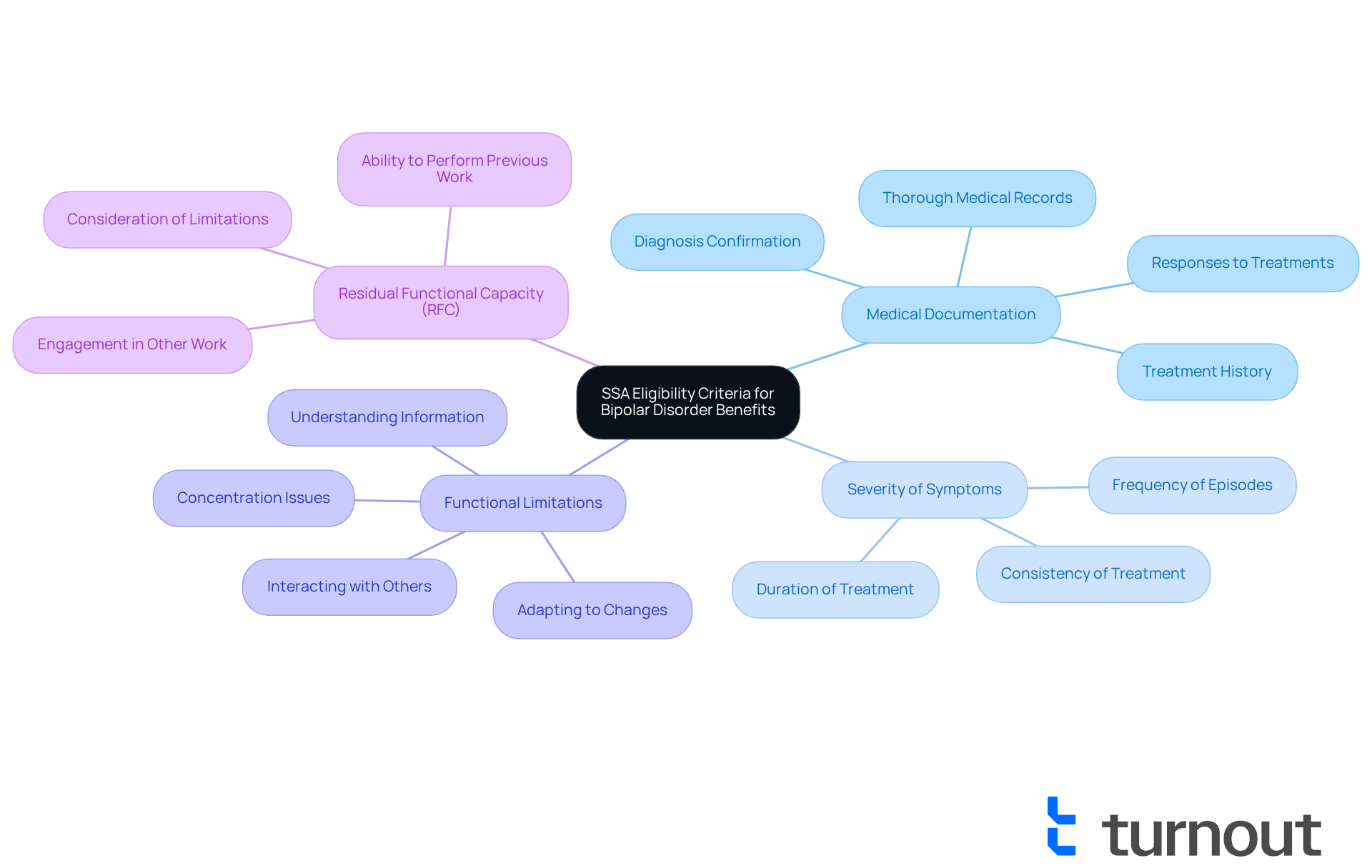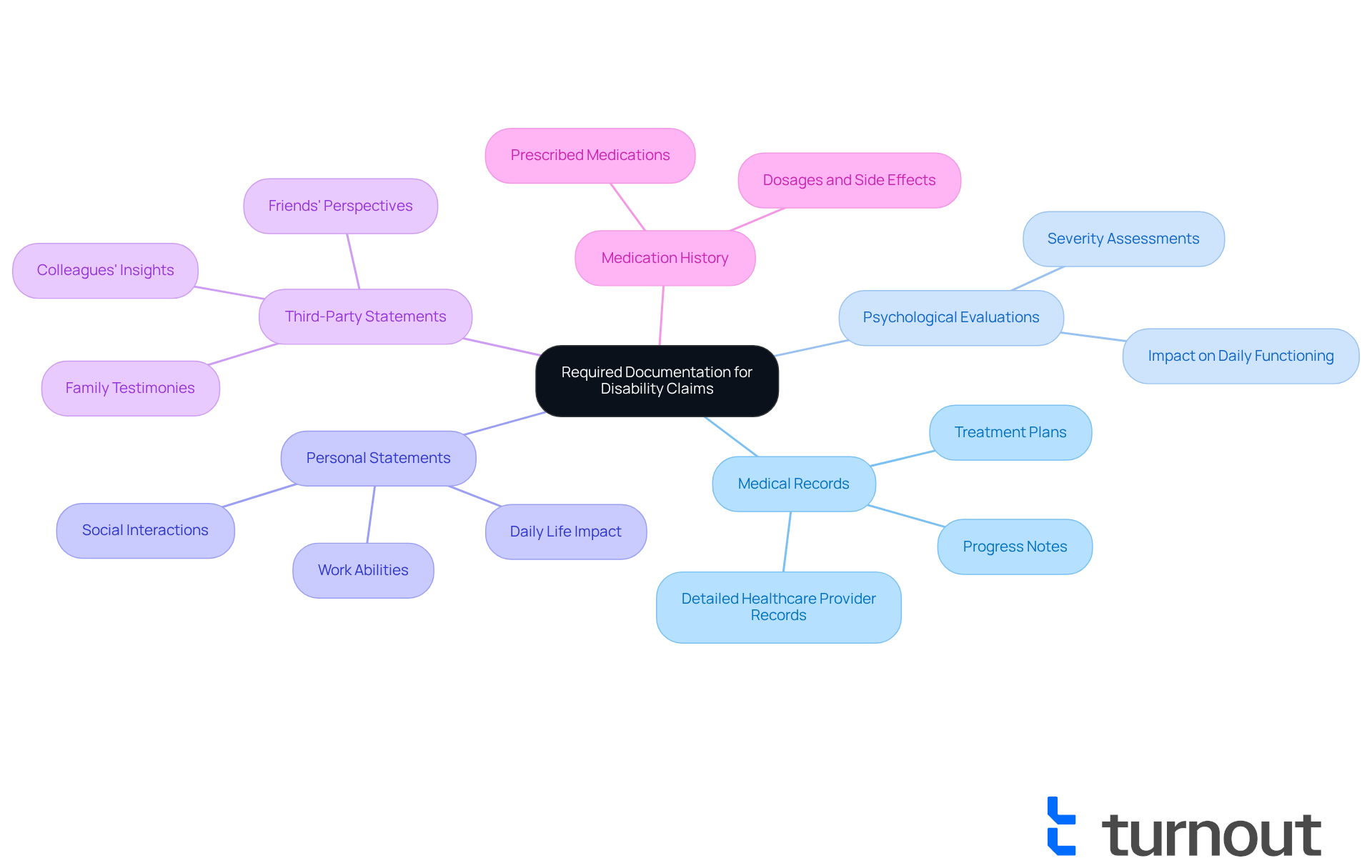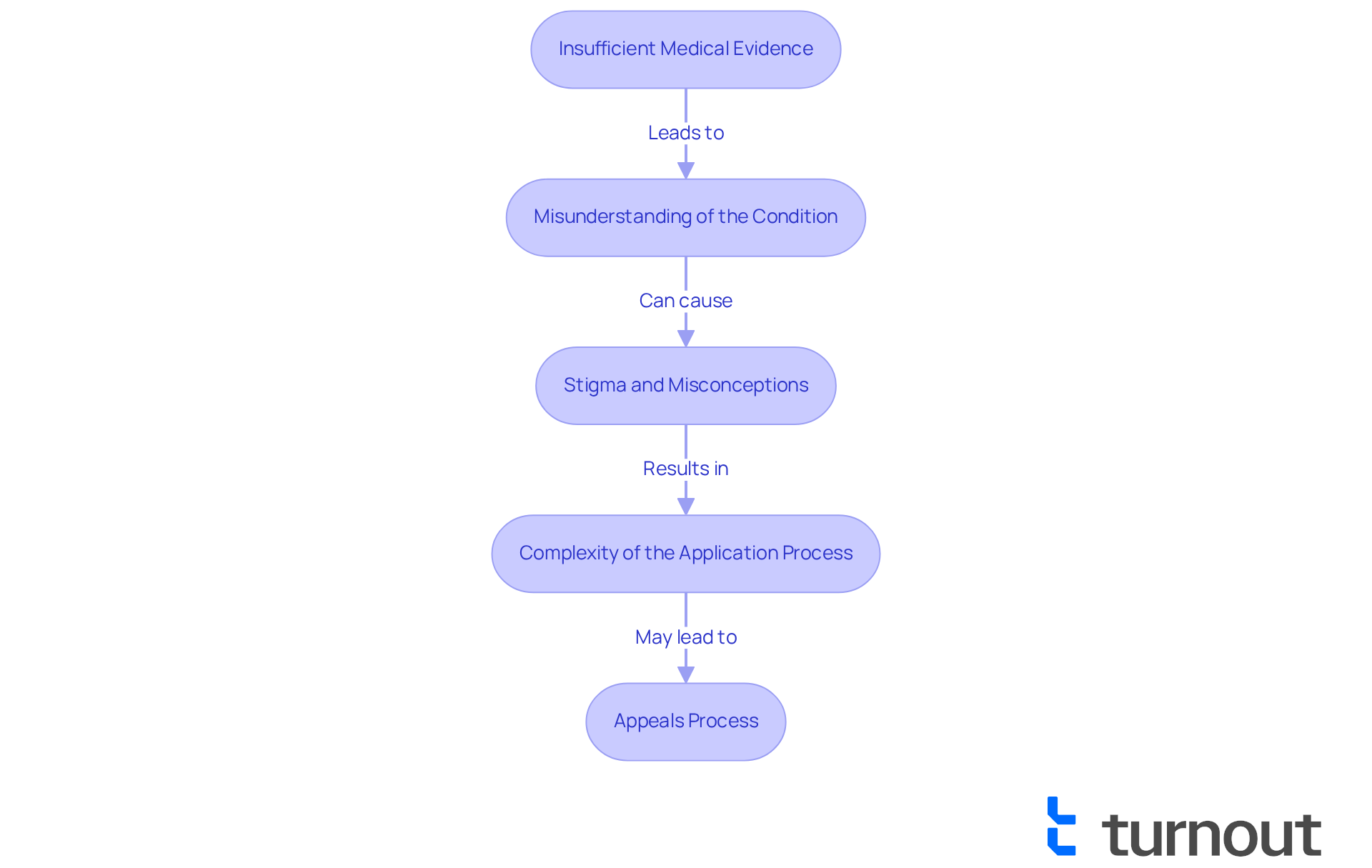Overview
Navigating the path to obtaining disability for bipolar disorder can feel overwhelming. It's important to know that the chances of approval depend on meeting specific criteria set by the Social Security Administration (SSA). This includes:
- Providing thorough medical documentation
- Demonstrating significant functional limitations due to your condition
We understand that this process can be daunting. However, with careful preparation and a solid understanding of the SSA's requirements, you can enhance your likelihood of approval. Statistics reveal that 30% of individuals with mood disorders receive benefits, highlighting that, despite the challenges, success is possible.
Remember, you are not alone in this journey. We're here to help you through each step, ensuring you have the support you need to present your case effectively. Your well-being matters, and taking action now can lead to the assistance you deserve.
Introduction
Bipolar disorder, often marked by dramatic mood swings, presents significant challenges for those affected and the support systems in place. We understand that navigating the complexities of mental health can be overwhelming. For many individuals, grasping the likelihood of obtaining disability benefits for this condition is crucial.
The Social Security Administration recognizes bipolar disorder as a debilitating mental illness, but the journey to securing benefits can be fraught with obstacles. From insufficient medical documentation to the stigma surrounding mental health issues, it's common to feel discouraged.
How can you effectively navigate this intricate process to enhance your chances of receiving the support you need? We're here to help you through this journey.
Define Bipolar Disorder and Its Disability Classification
Bipolar condition, previously known as manic-depressive illness, is a mental health issue that many individuals face. It is marked by significant mood variations, including emotional highs, such as mania or hypomania, and lows, which can lead to depression. These mood shifts can disrupt sleep, energy levels, activity, judgment, behavior, and cognitive clarity.
We understand that living with this condition can be challenging. Recognized by the Social Security Administration (SSA) as a mental illness, bipolar disorder can significantly hinder daily functioning and affect the chances of getting disability for bipolar disorder. The SSA classifies manic-depressive conditions in its listings of mental disorders, particularly within the mental impairments section.
To qualify for disability benefits, individuals must demonstrate that their condition meets specific SSA criteria, including the chances of getting disability for bipolar disorder. This includes a medically documented history of the condition and evidence of significant functional limitations. Research indicates that around 82.9% of adults with mood instability encounter significant challenges, highlighting the profound impact this condition has on everyday life and professional capabilities.
Moreover, the SSA’s classification of mood instability as a disability emphasizes the chances of getting disability for bipolar disorder, underscoring the importance of thorough medical records and a reliable treatment history in supporting claims for benefits. Real-life experiences show that many individuals with mood fluctuations struggle to regain full work ability after diagnosis, with some unable to work for an average of 65.5 days annually.
It's common to feel overwhelmed in navigating the complexities of the disability benefits system. This emphasizes the need for tailored support and advocacy. Remember, you are not alone in this journey, and we're here to help you find the assistance you need.

Outline SSA Eligibility Criteria for Bipolar Disorder Benefits
If you are seeking disability benefits for a mood condition, it's essential to understand the chances of getting disability for bipolar disorder. We recognize that navigating this process can be challenging, and we're here to help you every step of the way. To qualify, applicants must demonstrate that their situation significantly limits their ability to perform essential work tasks. The Social Security Administration (SSA) evaluates claims for bipolar disorder based on several key criteria:
-
Medical Documentation: You will need to provide thorough medical records that confirm a diagnosis of bipolar disorder, including your treatment history and responses to various treatments. This documentation is crucial, as the SSA requires detailed evidence to support your request. Turnout employs trained nonlegal advocates who can assist you in gathering and presenting this documentation effectively.
-
Severity of Symptoms: The SSA looks closely at the severity of your symptoms, focusing on how often you experience manic and depressive episodes. Recent updates indicate that candidates may need to show consistent treatment over a two-year period without significant improvement to strengthen their claims.
-
Functional Limitations: It's important to demonstrate that your condition leads to significant limitations in key areas such as understanding or applying information, interacting with others, concentrating, and adapting to changes in your environment. This is vital for illustrating how bipolar disorder affects your daily life.
-
Residual Functional Capacity (RFC): If the SSA finds that you cannot perform your previous work, they will evaluate whether you can engage in any other type of work, taking into account your limitations. This assessment is essential for understanding your overall ability to work in various capacities.
We want to emphasize that Turnout is not a law firm and does not provide legal advice. Statistics show that individuals with mood instability often face challenges in obtaining approval for disability benefits, impacting their chances of getting disability for bipolar disorder, with 73.9% of disabled adult children receiving assistance due to intellectual and other mental health issues. However, with thorough medical documentation and a clear demonstration of functional limitations, your chances of getting disability for bipolar disorder can significantly improve.
Additionally, Turnout offers tax debt relief services to further assist you in managing your financial challenges. The SSA's Compassionate Allowances program has expedited the process for certain serious conditions, which may include specific instances of mood disorders, allowing for quicker access to vital assistance. More than 1.1 million people with profound disabilities have benefited from this expedited procedure, highlighting its significance in the application process. Remember, you are not alone in this journey, and we are committed to supporting you as you seek the help you need.

Detail Required Documentation and Evidence for Claims
When seeking the chances of getting disability for bipolar disorder, it is important to provide thorough documentation to support your claims. We understand that this process can feel overwhelming, but having the right documents can make a significant difference. Key documents to gather include:
-
Medical Records: Detailed records from your healthcare providers, including diagnoses, treatment plans, and progress notes, are essential. These documents provide a clear picture of your mental health history and treatment trajectory.
-
Psychological Evaluations: Assessments from mental health professionals are crucial. They evaluate the severity of your condition and its impact on your daily functioning. Such evaluations enhance the credibility of your claim, offering objective insights into your situation.
-
Personal Statements: Written narratives that explain how your bipolar condition influences your daily life, work abilities, and social interactions are vital. These narratives illustrate the real-world implications of the disorder.
-
Third-Party Statements: Testimonies from family members, friends, or colleagues provide additional perspectives on your condition and its effects on your life. These statements can support your experiences and challenges.
-
Medication History: Documentation of prescribed medications, dosages, and any side effects experienced can illustrate the ongoing nature of your condition. This information is critical in demonstrating the seriousness of the disorder and the efforts made to manage it.
Turnout streamlines the process of collecting and submitting this documentation, ensuring you have the essential support to navigate the complexities of SSD requests. It's important to acknowledge that Turnout is not a legal practice and does not offer legal representation; rather, we engage trained nonlegal advocates to assist with SSD applications. Proper documentation and support can significantly enhance your chances of getting disability for bipolar disorder by up to 40% across all mental health categories, highlighting the importance of meticulous preparation in the application process. Furthermore, about 30% of individuals are awarded Social Security disability benefits for mood disorders, emphasizing the competitive nature of these requests. Understanding the specific criteria outlined in the SSA's Blue Book, including the requirement to demonstrate three or more symptoms such as pressured speech and decreased need for sleep, is essential for improving your chances of getting disability for bipolar disorder. Remember, you are not alone in this journey, and we are here to help you every step of the way.

Identify Common Challenges in Securing Disability Benefits
Navigating the process of obtaining chances of getting disability for bipolar disorder can be challenging. Many individuals face significant obstacles along the way. Here are some key challenges you might encounter:
-
Insufficient Medical Evidence: It's common for requests to be denied due to inadequate medical documentation that doesn’t meet the Social Security Administration (SSA) standards. Comprehensive medical records, including treatment history and detailed evaluations, are essential for supporting your mental health disability claim.
-
Misunderstanding of the Condition: Articulating how your symptoms affect daily functioning can be difficult. This lack of clarity might lead SSA evaluators to misinterpret the debilitating nature of your condition. We understand that communicating your experience is crucial.
-
Stigma and Misconceptions: The stigma surrounding mental health issues can impact how claims are perceived. Assessors may underestimate the severity of bipolar conditions, resulting in unfair rejections. In 2022, over 2 million individuals, about 12% of all SSDI beneficiaries, received benefits for mood disorders, highlighting the prevalence of these conditions.
-
Complexity of the Application Process: The application process can feel overwhelming, with numerous forms and requirements that may confuse you. This complexity often leads to partial submissions, which can delay or jeopardize your request. Statistics show that over 72% of mental health requests, which include the chances of getting disability for bipolar disorder, are rejected on the initial submission. That's why thorough preparation is so important. Turnout offers resources and services to help you navigate these complexities, ensuring you are better prepared to meet SSA standards.
-
Appeals Process: If your claim is denied, the appeals process can seem daunting. You may need to gather additional documentation and navigate a complicated system, often requiring professional assistance to improve your chances of success. While only about 35% of initial applications are approved, statistics indicate that there are better chances of getting disability for bipolar disorder, as 62% of second appeals are awarded to applicants. This underscores the potential for success upon further review. Turnout's trained nonlawyer advocates are here to assist you in this process, providing support without establishing an attorney-client relationship.
Remember, you are not alone in this journey. We’re here to help you every step of the way.

Conclusion
Bipolar disorder, marked by extreme mood swings that can profoundly affect daily life, is recognized by the Social Security Administration as a legitimate mental health condition eligible for disability benefits. We understand that navigating this complex process can be overwhelming. Recognizing your chances of obtaining disability for bipolar disorder is crucial. This article emphasizes the importance of comprehensive medical documentation, a clear demonstration of functional limitations, and the need for strong support throughout your application journey.
Key insights include:
- The necessity of thorough medical records
- Psychological evaluations
- Personal statements to substantiate your claims
It’s common to face challenges, such as insufficient evidence and the stigma surrounding mental health, which can hinder success rates. However, with the right preparation and support, you can improve your chances of receiving the benefits you need. Statistics show that while initial applications often face rejection, there is a higher success rate during the appeals process. This highlights the importance of persistence and proper advocacy.
Ultimately, the journey toward securing disability benefits for bipolar disorder can feel daunting. Remember, you are not alone. Seeking assistance from knowledgeable advocates can make a significant difference in navigating the complexities of the system. By understanding the requirements and preparing adequately, you can enhance your chances of obtaining the support you deserve, thus improving your quality of life.
Frequently Asked Questions
What is bipolar disorder?
Bipolar disorder, previously known as manic-depressive illness, is a mental health condition characterized by significant mood variations, including emotional highs (mania or hypomania) and lows (depression). These mood shifts can disrupt various aspects of daily life, such as sleep, energy levels, activity, judgment, behavior, and cognitive clarity.
How does bipolar disorder affect daily functioning?
Bipolar disorder can significantly hinder daily functioning, impacting an individual's ability to perform routine tasks, maintain relationships, and manage work responsibilities. Research indicates that about 82.9% of adults with mood instability face substantial challenges in their everyday life and professional capabilities.
Is bipolar disorder classified as a disability?
Yes, bipolar disorder is recognized by the Social Security Administration (SSA) as a mental illness, and it is classified as a disability within the SSA's listings of mental disorders, specifically in the mental impairments section.
What are the criteria for qualifying for disability benefits for bipolar disorder?
To qualify for disability benefits for bipolar disorder, individuals must demonstrate that their condition meets specific SSA criteria. This includes having a medically documented history of the condition and evidence of significant functional limitations that impact daily life.
How does the SSA's classification of mood instability affect disability claims?
The SSA's classification of mood instability as a disability underscores the importance of thorough medical records and a reliable treatment history in supporting claims for benefits. It highlights the chances of getting disability for bipolar disorder, which can be crucial for those seeking assistance.
What is the average work impact for individuals with bipolar disorder?
Many individuals with mood fluctuations struggle to regain full work ability after their diagnosis, with some unable to work for an average of 65.5 days annually.
What support is available for navigating the disability benefits system?
Navigating the complexities of the disability benefits system can be overwhelming. It is important to seek tailored support and advocacy to help individuals find the assistance they need.




